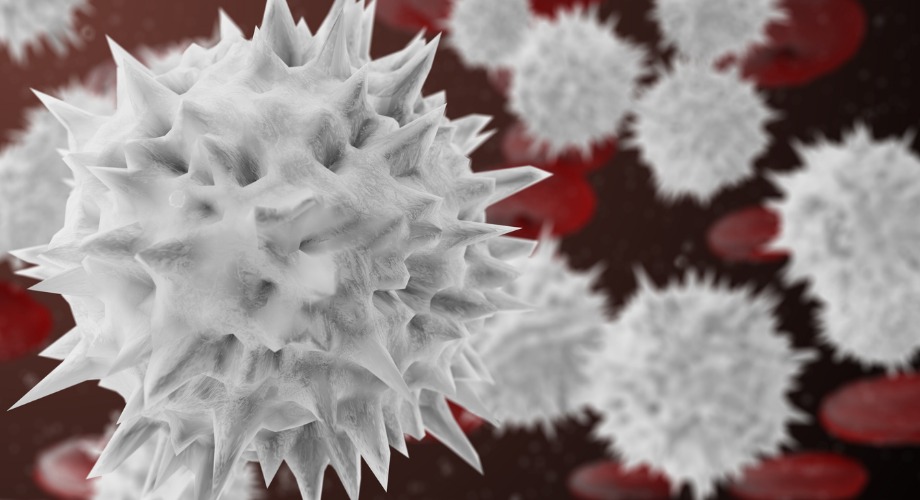
Long thought to be short-lived, indiscriminate attackers of infected cells, a new study shows that "natural killer" cells can actually remember old enemies, allowing them to better identify threats and hone their attack. The knowledge may prove useful in developing new types of vaccines.
Forget what the textbooks say, human ‘natural killer’ cells do remember past viral attacks
May 20, 2019
LA JOLLA, CA – Scientists at Scripps Research have discovered that the immune system’s “natural killer” (NK) cells have a hidden talent. Long thought to be short-lived, indiscriminate attackers of infected cells, a new Science Immunology study shows that NK cells can actually remember old enemies, allowing them to better identify threats and hone their attack.
In fact, the cells’ ability to recall past threats may allow scientists to design vaccines to train NK cells to target tough pathogens, such as HIV.
“This research shows that the immune system has another way of remembering prior infection or vaccination,” says Silke Paust, PhD, an associate professor at Scripps Research and senior author of the new study. “This might be a unique opportunity to protect ourselves from disease.”
NK cells are a type of white blood cell that got their killer name because they can quickly destroy cells infected by viruses, as well as potentially cancerous cells. But NK cells have their limits. The cells are traditionally thought of as part of the “innate” immune system, a set of cells that respond quickly to disease threats but are not designed to remember specific pathogens.
Over the last decade, however, Paust and other researchers began to suspect that NK cells were more complex than traditionally believed. Research showed that—at least in mice—NK cells had “immunological memory,” meaning they could more quickly target a past attacker. Could the same hold true in humans?
"Because so much about these cells is unknown, and so many dogmatic ideas are being challenged, there is a lot of opportunity to explore these cells in ways never done before,” says Rana Nikzad, PhD, a research associate in Paust’s lab and first author of the study.
For the new study, Paust and her colleagues teamed up with a research group at University College London, led by Arne Akbar, PhD, to study human volunteers who had gotten chicken pox when they were younger. Chicken pox, caused by the varicella-zoster virus, is known for triggering B and T immune cell memory—but never NK cell memory.
The scientists exposed the volunteers to antigens, parts of the varicella-zoster virus, to see how their NK cells would respond. To their surprise, NK cells remembered the virus and could specifically target the antigens even decades after chicken pox infection.
“We were really excited to see this,” says Paust.
The researchers then tested how NK cells responded to a virus that is harder for the body to defeat: HIV. They worked with a “humanized” mouse model engineered to produce many of the same cells present in the human immune system.
Nikzad gave the mice a vaccine that contained pieces of HIV’s outer envelope protein. The body needs to be able to recognize and remember this envelope protein in order to defend against the virus.
The scientists then isolated NK cells from spleens and livers of these mice and discovered that they did remember the HIV envelope protein. Thanks to the vaccine, the NK cells specifically targeted HIV antigens and ignored other pathogens. The NK cells exhibited antigen-specificity—something not thought possible for cells of the innate immune system.
“The discovery of human NK memory opens the door to targeting this subset of cells with vaccines and therapies to fight infectious disease and perhaps even cancer,” says Nikzad.
For example, NK cells are good at responding very quickly to pathogens. Scientists could take advantage of this trait by designing vaccines against pathogens infamous for also moving quickly. If these vaccines could prompt an NK cell response, the body could be ready to defend itself against diseases that have been traditionally very hard to treat.
The team now wants to investigate more human NK cell samples to see how they respond to other diseases. They are curious to see how good the cell responses can be—and how rapid.
“There is still a lot of work to be done, including mechanistic studies to understand how NK cell memory works, but this is an exciting first step,” says Nikzad.
In addition to Paust, Nikzad and Akbar, authors of the study, “Human natural killer cells mediate adaptive immunity to viral antigens,” included Laura S. Angelo, Kevin Aviles-Padilla, Duy T. Le, Vipul K. Singh, Lynn Bimler, Milica Vukmanovic-Stejic, Elena Vendrame, Thanmayi Ranganath, Laura Simpson, Nancy L. Haigwood and Catherine A. Blish.
The study was supported by the National Institutes of Health (grants RO1 AI116282, AI116282-S1, P30 AI036211-20, T32GM088129 and AI053831), an AIDS/HIV Research Supplement to SPORE in Lymphoma (grants P50 CA126752, R56 AI124788 and DP2 AI112193), the Ash Bridge Award (grants P01-OD011092 and AI036211), the UK Medical Research Council Grand Challenge in Experimental Medicine (grants MR/M003833/1 and MR/P00184X/1), Dermatrust and the British Skin Foundation.
For more information, contact press@scripps.edu

